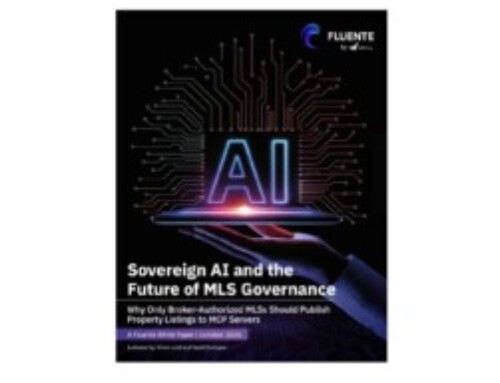
States like California are leading the charge to regulate artificial intelligence in consumer-facing applications, and real estate companies need to pay close attention. New laws are introducing specific requirements for disclosing AI-generated content to consumers and publishing details about the data used to train these systems. While California’s laws are among the most comprehensive, other states are following suit, making transparency and traceability in AI no longer optional.
This blog post breaks down what these laws require, where they’re spreading, and how real estate businesses – including brokers, MLSs, tech firms, and vendors – must respond.
What California’s new AI laws require
Two pieces of legislation passed in California go into effect on January 1, 2026. Each targets a different aspect of transparency in AI:
1. SB 942 – The AI Content Labeling Law
This law focuses on the output of AI systems and requires:
- Latent disclosures: All AI-generated or modified image, video, or audio content must contain embedded metadata identifying it as AI-generated. This includes the provider’s name, the AI system, a timestamp, and a unique content ID.
- Manifest disclosures: Users must be able to add visible disclaimers to AI-generated content – think watermarks or labels that consumers can easily see.
- Free detection tools: Developers must provide free, publicly accessible tools that allow anyone to verify whether content was AI-generated.
- Licensing rules: If an AI system is licensed to third parties, developers must ensure those third parties maintain disclosure features – and must revoke access within 96 hours if they’re removed.
- Penalties: Violations can result in fines of up to $5,000 per day.
2. AB 2013 – The AI Training Data Disclosure Law
This law targets how AI systems are trained, requiring developers to:
- Publicly list data sources used to train generative AI models.
- Describe the type of data (e.g., public records, copyrighted materials, personal information).
- Provide timelines of data collection, any synthetic data use, and preprocessing steps taken.
- Identify whether the data includes consumer-generated content or private records.
These laws apply to any system with more than one million users or those made available in California after 2022.
Other states pursuing AI regulation
California may be first to enact broad content labeling and training disclosure rules, but it’s not alone:
- Illinois and New York have introduced bills requiring clear identification of AI-generated content in advertising.
- Colorado, Connecticut, and Virginia have passed AI-related consumer protection and data privacy laws that touch on disclosure.
- The FTC is currently reviewing its authority to enforce deceptive AI content under existing laws.
Companies operating in multiple states will need to standardize compliance measures across jurisdictions.
Real estate technology at risk of non-compliance
Many tools used by brokerages, MLSs, and real estate agents rely on AI to enhance productivity and customer experience. These technologies will now need to disclose when AI is in use and clarify the source of their training data. Here’s a summary of the main tech categories and how they may be affected:
| Technology category | Example companies | Primary law impacted | Compliance risk (1–5) | Why at risk |
| Virtual staging & image enhancement | Restb.ai | SB 942 | 5 | AI modifies listing media; must embed metadata and support visible labels |
| AI-powered marketing platforms | Jasper, ChatGPT | SB 942 | 4 | Generates public-facing content; labeling is required |
| MLS data enhancement & analytics platforms | Cotality, Remine | AB 2013 | 4 | Uses proprietary and MLS datasets; must disclose data sources |
| Consumer-facing listing portals | Zillow, Redfin, Realtor.com | Both SB 942 & AB 2013 | 3 | Publishes AI-written summaries, video tours |
| AI chatbots & digital assistants | Ylopo, Roof.ai, OJO Labs | SB 942 (voice/video only) | 2 | Only a concern if AI responses are audio or video |
| Automated valuation models (AVMs) | Zestimate, HouseCanary | AB 2013 | 2 | Must disclose training data sources if AI-driven |
Agent-created AI content on social media: a hidden risk
One of the most overlooked compliance risks is agents using generative AI tools to create social media posts. Tools like ChatGPT, Canva, Jasper, or Lately.ai are frequently used to draft property descriptions, create image captions, and generate market updates.
If this content includes images, audio, or video, or if it creates original written content that is presented as factual or advisory, it may be subject to SB 942’s disclosure requirements.
Example of a compliant disclosure for social media:
Caption: “Thinking about selling your home this spring? Check out these quick tips for boosting curb appeal.”
Disclosure (required): “Post generated with assistance from AI. Information is general and not a substitute for expert advice.”
This disclosure should be included as a visible part of the post – either within the caption or in a visible graphic overlay for video or image content.
Brokerages and MLSs should train agents on when and how to use these disclaimers, especially when AI tools are used to generate any consumer-facing messaging.
Copyright risks and protections for broker-generated content
A related compliance and legal issue concerns how AI content and editing tools may unintentionally violate copyright laws – especially when brokers or MLSs alter or reuse original listing content.
Under U.S. copyright law, listing photos and property descriptions created by a broker or their agent are considered original works and are protected.
When another broker, MLS, or syndication platform uses AI tools to modify that content (for example, to create new images, rewrite descriptions, or train models), this can cross the line into unauthorized derivative use.
California’s AI labeling law (SB 942) strengthens copyright protection by requiring latent disclosures in AI-modified media. This means:
- Original creators can track alterations: With embedded metadata, brokers can more easily identify when and how their content was altered.
- Unauthorized AI enhancement is traceable: If another party modifies copyrighted content without permission, the disclosure requirement makes it more visible and enforceable.
Is this a copyright violation?
Yes – if another broker, MLS, or vendor alters listing media or descriptive text that a broker created, and does so without a license or legal agreement, that may constitute a copyright infringement.
Brokerages should:
- Explicitly assert copyright in listing agreements and in MLS submissions.
- Require attribution and disclosure from any AI-enhanced marketing vendor.
- Monitor for unauthorized modifications of their listing content in downstream distribution.
By combining these actions with the compliance requirements of SB 942, brokers gain new tools for both transparency and intellectual property protection.
Examples of compliant labeling practices
Real estate tech companies can start preparing by implementing these examples of latent and manifest disclosures:
Virtual staging & image enhancement
- Embed metadata in photos using IPTC/XMP fields:
- AI_Generated: True
- Provider: Restb.ai
- Timestamp: 2025-04-29T12:30:00Z
- Content_ID: 7c92f1e3-4481-4f92-9cc8-1f8478900abc
- Add visible overlays on images: “Virtually staged with AI”
AI-powered marketing tools
- Add a text disclaimer at the bottom of AI-written ads or blog posts: “This content was generated with the help of AI.”
- For downloadable documents, embed metadata or place comments in the footer disclosing AI authorship.
MLS and AVM vendors
- Publish a dataset disclosure page outlining training data sources.
- Specify if data includes consumer records, copyrighted materials, or synthetic datasets.
Consumer portals
- Place on-screen labels or footnotes under AI-generated property descriptions: “Generated with AI and public data.”
- Embed metadata in narrated video tours to document AI synthesis.
Chatbots and assistants
- Add pre-roll audio or pop-up banners: “This is an AI-powered assistant.”
- Tag conversation logs or transcripts with metadata noting AI system identity and timestamp.
The path to readiness
The California laws go into effect in 2026, but compliance planning should start now. CEOs and brokerage leaders should:
- Audit current marketing and tech vendors to assess whether AI is used.
- Require disclosures in vendor contracts.
- Establish internal policies for AI-generated content.
- Educate agents on where and how AI is used in the business.
WAV Group recommends technology providers and brokerages designate a compliance lead or committee to oversee implementation and monitoring. With proactive preparation, companies can remain compliant – and maintain trust with their clients and consumers – as AI transparency becomes law.
WAV Group consultants Victor Lund (Strategic Advisor), David Gumpper (Technical Advisor), and Kevin Hawkins (Communications Advisor) are all available to support your organization with plans to implement best practices so that the benefits of AI do not land your company in compliance hell. Feel free to reach out below.





Thank you for this informative post.